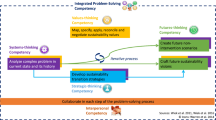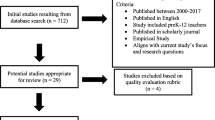Abstract
There has been continued debate regarding educational policies and practices regarding the lifelong learning social order with significant focus upon the preparation of educators of children and youth for this global lifelong learning society. However, there has been limited discussion and research regarding the professional preparation of lifelong learning adult educators. This article investigates the current status of graduate professional programs to prepare lifelong learning adult educators (individuals who are prepared and credentialed through a professional graduate master's degree in adult education and human resource development). Because of differing international policies and structures of graduate education, this discussion will present a comparative examination of current structures and characteristics of master's degree programs at two institutional sites located in Denmark and the USA. Current objectives, characteristics, and understandings of graduate professional preparation programs will be delineated between these two case studies. Contextual issues and influences in the preparation of lifelong learning adult educators will be discussed, with comparative discussions of cultural norms and policies regarding graduate professional preparation, innovative programmatic and instructional efforts, engagement of theory and best practices in lifelong learning, and comparative cultural differences between program students and faculty.
Similar content being viewed by others
References
Aspin, D., Chapman, J., Hatton, M., & Sawano, Y. (Eds). (2001). International handbook on lifelong learning (two volumes). Dordrecht, the Netherlands: Kluwer Press.
Blom Andersen, N., & Hemmingsen, L. (2002). Nye mastere på DPU- en procesevaluering af starten, Danmarks pædagogiske Universitet.
Boyd, R. B. (1969). New designs for Adult Education doctoral programs. Adult Education, 19(3), 186–196.
Brookfield, S. (1988a). A curricular and programmatic analysis of graduate Adult Education in North America. In S. Brookfield (Ed.), Training educators of adults (pp. 266–278). London: Routledge.
Brookfield, S. (1988b). Graduate adult education as a socio-cultural product: A cross-cultural analysis of theory and practice in the United States and Great Britain. In S. Brookfield (Ed.), Training educators of adults (pp. 279–316). London: Routledge.
Brookfield, S. (2000). The concept of critically reflective practice. In A. L. Wilson & E. R. Hayes (Eds.), Handbook of adult and continuing education. New Edition (pp. 33–53). San Francisco: Jossey-Bass.
Carlsson, M., & Hemmingsen, L. (2004). Evaluering af masteruddannelser på DPU. Danmark Pædagogiske Universitet.
Chapman, J., & Aspin, D. (2000). Lifelong learning: concepts and conceptions. International Journal of Lifelong Education, 19(1), 2–19.
Commission of Professors of Adult Education. (n.d.). Standards for graduate programs in Adult Education. Retrieved December 31, 2004, from http://www.cedu.niu.edu/cahe/resources.htm.
Commission of the European Communities. (2000). Commission working paper: A memorandum on lifelong learning. Retrieved December 27, 2004, from http://europa.eu.int/comm/education/policies/lll/life/memoen.pdf.
Commission of the European Communities. (2004, 21/2). Commission staff working paper: Progress towards the common objectives in education and training. Indicators and benchmarks. Retrieved December 28, 2004, from http://europa.eu.int/comm/education/policies/2010/doc/progress_towards_ common_objectives_en.pdf.
Conrad, C. F., Haworth, J. G., & Millar, S. B. (1993). A silent success: Master’s education in the United States. Baltimore: John Hopkins University Press.
Delors, J., & Others. (1998). Learning: The treasure within: Report to UNESCO of the International Commission on Education for the Twenty-first Century. Retrieved December 28, 2004, from http://www.unesco.org/delors/utopia.htm.
Ellström, P. E. (1997). Kompetens, utbilding och lärande i arbejslivet. Stockholm: Publica.
EU Memorandum. (2000). Memorandum om livslang læring. Arbejdsdokument fra Kommissionens tjenestegrene. Retrieved October 30, 2000 http://us.uvm.dk/videre/voksenuddannelse-dk/livslanglaering.index.html.
European Commission. (1995). Teaching and Learning: Towards the Learning Society. Retrieved January 9, 2006. http://europa.eu.int/comm/off/white/index_en.htm.
Glazer, J. S. (1986). The master’s degree: Tradition, diversity, innovation. Washington, DC: Association for the Study of Higher Education.
Hake, B. (1999). Lifelong learning in late modernity: The challenges to societies, organizations, and individuals. Adult Education Quarterly, 49(2), 79–90.
Haworth, J. G., & Conrad, C. F. (1995). Master’s education in the United States: A contemporary portrait. In: P. M. Nerad, R. June, & D. S. Miller (Eds.), Graduate education in the United States (Vol. 2, pp.␣263–282). New York: Garland.
Istance, D., Schuetze, H., & Schuller, T. (Eds.). (2002). International perspectives on lifelong learning: From recurrent education to the knowledge society. Buckingham: Open University Press.
Jarvis, P. (Ed.). (2002). The age of learning. Adult and continuing education in Europe. London: Kogan Page.
Korsgaard, O. (1999). Kundskabskapløbet-Uddannelse i videnssamfundet. Gyldendal København.
LaPidus, J. B. (2000). Postbaccalaureate and graduate education: A dynamic balance. In K. J. Kohl & J.␣B.␣LaPidus (Eds.) Postbaccalaureate futures: New markets, resources, credentials (pp. 3–9). Phoenix: American Council on Education/Oryx Press.
Longworth, N., & Davies K. W. (1996). Lifelong learning. London: Kogan Page.
National Center for Education Statistics (1998). Students financing of graduate and first-professional education, 1995–96, (Statistical Analysis Report NCES 99–083). Washington, DC: National Center for Educational Statistics.
Peters, J. M. (1991). Advancing the study of adult education: A summary perspective. In J. M. Peters, P.␣Jarvis, & Associates (Eds.), Adult education: Evolution and achievements in a developing field of study (pp. 421–446). San Francisco: Jossey-Bass.
Peterson, R. E., & Associates. (1979). Lifelong learning in America. San Francisco: Jossey-Bass.
Schon, D. (1987). Educating the reflective practitioner. Toward a new design for teaching and learning in the professions. San Francisco: Jossey-Bass.
Schon, D. (1983). The reflective practitioner: How professionals think in action. NY: Basic Books.
Spencer, D. S. (1986). The masters degree in transition. Washington, DC: Council of Graduate Schools.
Telhauge, A. O. (1990). Den nye utdanningspolitiske retorikken. Oslo: Universitetsforlaget.
Undervisningsministeriet. (2002). Bekendtgørelse om visse masteruddannelser ved universiteterne København: Undervisningsministeriet.
Wilson, A. L., & Hayes, E. R. (2000). A selective history of the adult education handbooks. In A. L. Wilson & E.␣R. Hayes, (Eds.), Handbook of adult and continuing education. New edition (pp. 3–14). San Francisco: Jossey-Bass.
Author information
Authors and Affiliations
Corresponding author
Rights and permissions
About this article
Cite this article
Kasworm, C., Hemmingsen, L. Preparing professionals for lifelong learning: Comparative examination of master’s education programs. High Educ 54, 449–468 (2007). https://doi.org/10.1007/s10734-006-9006-8
Received:
Accepted:
Published:
Issue Date:
DOI: https://doi.org/10.1007/s10734-006-9006-8




